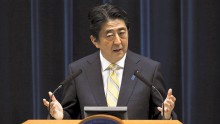On June 5-6, Japanese Prime Minister Shinzo Abe will pay an official visit to Ukraine. This will be the first visit of the head of Japanese government in the history of Ukraine-Japan relations. At the same time, three Ukrainian presidents and one prime minister have already visited Japan. Yet, the only result of these visits had been the signing of Ukrainian-Japanese Global Partnership agreement in January 2011.
The president’s press office has noted that Shinzo Abe’s visit on the eve of G7 Summit will be a powerful statement of solid and unanimous political support to Ukraine. “During the meetings and talks, the parties will discuss the full range of issues concerning bilateral cooperation in political, economic, scientific, technological, and humanitarian spheres, outstanding issues of global and regional agenda, as well as cooperation between Ukraine and Japan within international organizations,” the note follows.
The Day has addressed Ihor Kharchenko, Ambassador of Ukraine to Japan, asking about Ukrainian expectations from this visit, and about the manner in which the Ukrainian-Japanese global partnership might be filled with a concrete meaning.
“Japan supports Ukraine as the ‘Group of Seven’ member within UN and other international organizations. Today we can say that in the Asia-Pacific region, Japan is the main and pivotal partner.
“Indeed, a document on global Ukraine-Japan partnership had been signed a few years ago. But in reality it never had the full effect, except in the cooperation concerning Fukushima-Chornobyl.
“It is no big secret that the major blame for this underperforming lies on the Ukrainian side. But during the past year, this partnership, being fulfilled in a global dimension, was actually becoming evident. Since the beginning of Russian aggression against Ukraine, the Cabinet of Prime Minister Shinzo Abe, who is going to pay us the first visit in the history of our relations these days, has been expressing a clear and uncompromising message of support to Ukraine and to the fundamentals of the international law. Japan became one of the leading countries that provide assistance to Ukraine – not only in word but in deed. The scale of financial and economic assistance from Japan is unprecedented.
“Specifically, a project for Bortnychi water aeration facility reconstruction, worth more than a billion dollars, will soon be launched. By the way, Japanese prime ministers rarely go to Europe. The fact that Shinzo Abe visits Ukraine before the G7 Summit actually means that Ukrainian matters are essentially global today, and that Japan, as a responsible member of the international club of developed countries, understands it. As Japanese Prime Minister himself says, ‘today, the matter is not only in Ukraine,’ as the Russian policy on the post-soviet territory is a global challenge to the world order.”








